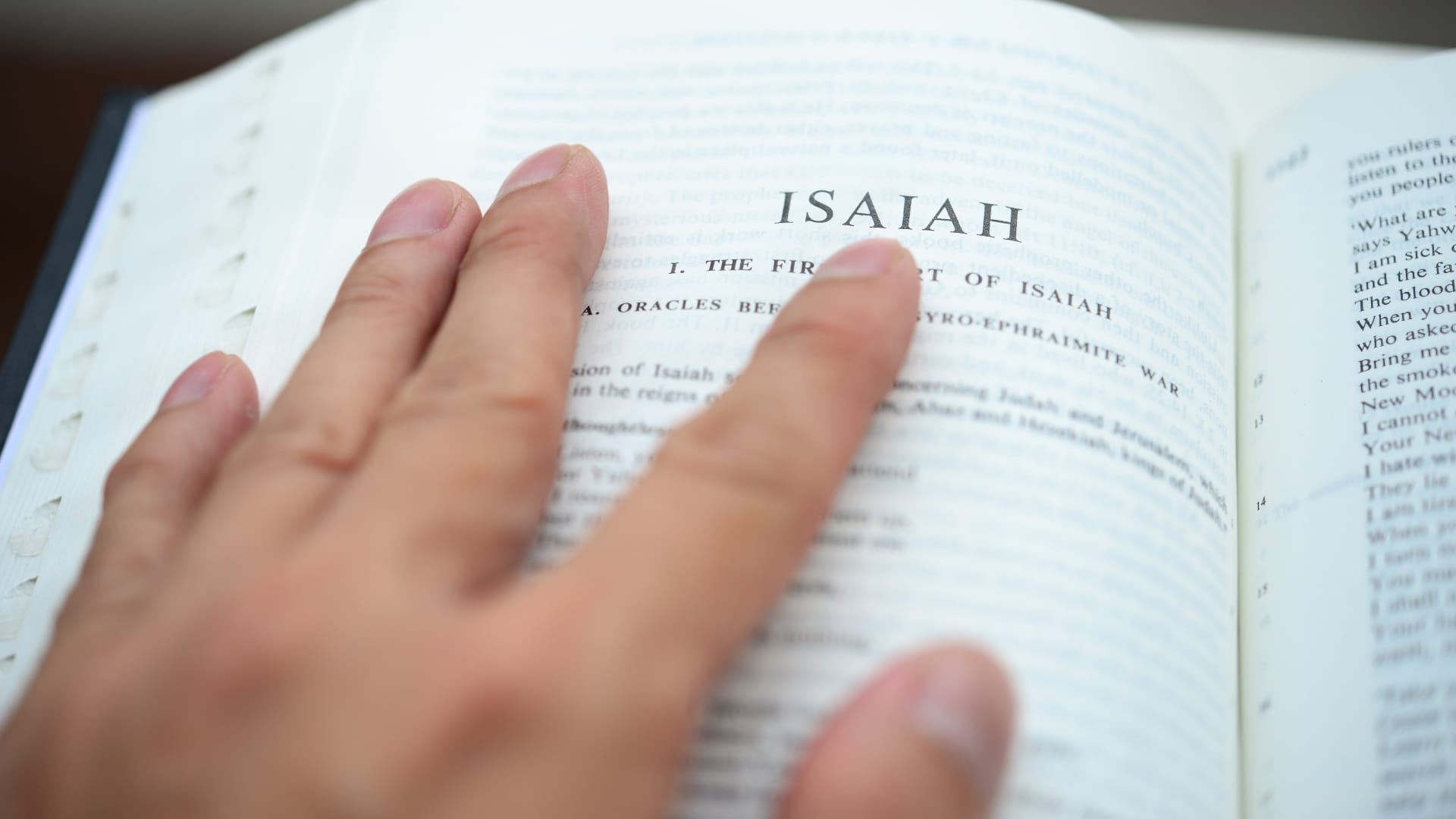The Gospel According to Isaiah (Isaiah 40:1-11)

Big Idea: There’s hope for us despite our sins because God will come, and you can count on it.
Something one of my teachers said has haunted me for years.
The teacher’s name was Haddon Robinson. He literally wrote the book on preaching. He was once named one of the twelve most effective preachers in the English-speaking world. He taught hundreds of students how to preach. On top of that, he was a man of integrity.
I once heard him say that out of all the sermons he’d heard preached, he had only heard a handful that explained the gospel clearly.
That haunts me. This giant of a preacher, a man who’d listened to countless sermons, said that he’d only heard a few that did a good job of explaining the core message of the Bible: what God has done through Jesus to rescue us from sin.
If there’s anything I want to do well in my preaching, it’s to clearly communicate the gospel. So I want to enlist the help of Isaiah, who gives us an outstanding announcement of good news in the passage we just read. I may struggle, but I’m pretty sure Isaiah won’t let us down.
This is a passage that’s often read in the season of Advent. It has three pieces of very good news for us, and one action that it wants us to take as a result of that good news.
So let’s look at this good, and what he wants us to do as a result.
Three Pieces of Good News
Here are the three pieces of good news.
First: There’s hope for us despite our sins (1-2)
Read the first two verses of chapter 40:
Comfort, comfort my people, says your God.
Speak tenderly to Jerusalem,
and cry to her
that her warfare is ended,
that her iniquity is pardoned,
that she has received from the LORD’s hand
double for all her sins.
(Isaiah 40:1-2)
If you read the first 39 chapters of his book, you would realize that Isaiah has not been bringing Israel good news. He’s been talking to Israel about a serious problem: their sin. In the first 39 chapters, God, through Isaiah, confronts Israel of rebellion, idolatry, and injustice. He promises to judge them by sending other nations to conquer Israel.
In fact, in the preceding chapter, Isaiah brings a word of judgment against their king Hezekiah (Isaiah 39:5-8). Israel would be exiled in Babylon. “Nothing shall be left, says the LORD” (Isaiah 39:6).
In the first 39 chapters, we read almost nothing but judgment. Isaiah articulated that God and that he requires holiness of his people, but they fell short. By the end of chapter 39, we’re not left with much hope as we look at God’s people. Isaiah articulates our greatest problem: that we fall short of the very reasonable standards of a holy God, and that we deserve nothing but his judgment. In other words, the context for chapter 40 is our failure.
In light of our failure, we are not prepared for the first words of chapter 40.
Here’s the good news that Isaiah has for us: although we fall short, although we deserve nothing but God’s judgment, God speaks words of comfort to us. His intentions for us are good. His ultimate purpose is not our destruction but redemption. It’s not death but life. His ultimate goal is not judgment but restoration.
Why? Because our warfare is ended (verse 1). The word warfare could be translated struggle. Their struggles, their time in exile has an expiry date. God will discipline Israel for their sins, but that discipline isn’t permanent. He will never abandon his people.
Isaiah says that Israel’s greatest problem - their sin — has been dealt with. “…her iniquity is pardoned, that she has received from the LORD’s hand double for all her sins.”
Their sins need to be paid for, but the payment that has been made more than covers the cost of their sin. Sin always comes at a cost. Someone must pay that cost. We didn’t make that payment; we never could. But Christ has made full payment for the sins of all who trust him, payment so abundant that there is no balance owed. As a result, God now speaks words of comfort to his people.
Our sins are a serious problem. They are an affront to a holy God. But they will not have the final word. What is the final word? That God’s intentions for us are good despite your sins. And so if you have trusted Jesus you can:
“See in God not a frown but a smile, not distance but nearness. Even when we don’t act like the people of God, he still identifies with us: “… my people … your God.” He stills calls us “Jerusalem,” even when we’re far away in exile.
Do you have glad expectations of God? You may, even as a sinner. (Ray Ortlund)
The gospel isn’t good news for the worthy. It’s good news for sinners. It’s that our sins won’t have the final word. Despite their sins, God still looks on his people with tenderness and compassion.
There’s hope for us despite our sins. It doesn’t matter how much you’ve sinned. There’s nobody here who doesn’t need this good news, and there’s nobody here out of the reach of this good news.
What is God’s word to you today? It’s one of comfort. Your sins are no obstacle to his compassion toward you, because full payment has been made for your sins. That is the amazing news that Isaiah expresses here: that God looks at us through Jesus not with a frown but a smile. He has tender words for you today, words of compassion and hope.
But that’s not all.
Second: There’s hope for us despite our sins because God will come (3-5).
How does this hope come to us? Is it be our trying harder? Suffering enough to cancel out our earlier sins? No. Our hope comes solely from the activity of God. We do nothing to save themselves. God does everything. We simply receive.
Read verses 3 to 5:
A voice cries:
“In the wilderness prepare the way of the LORD;
make straight in the desert a highway for our God.
Every valley shall be lifted up,
and every mountain and hill be made low;
the uneven ground shall become level,
and the rough places a plain.
And the glory of the LORD shall be revealed,
and all flesh shall see it together,
for the mouth of the LORD has spoken.”
(Isaiah 40:3-5)
Our hope is that God has acted. In verse 3, Isaiah hears a voice. Notice what this voice says. It says:
The Lord is coming. ““In the wilderness prepare the way of the LORD; make straight in the desert a highway for our God.” God is coming, so get ready. We could never come to God, so God is coming to us. He is coming to our aid. And he’s coming to meet us where we are: in the wilderness.
“The whole world is like a desert,” writes Tim Keller. “There’s death, there’s disease, there’s war, there’s poverty, there’s strife, and there’s brokenness of all sorts. The whole world is like this.” But God comes into the wilderness to meet us. We couldn’t leave the wilderness to find him, so he entered the wilderness to find us. The Lord comes into the world to save us.
It also says that when he comes, he will bring radical change. Valleys will be lifted. Mountains will be flattened. Uneven ground will become level. Rough places will be made into a plain. In other words, the Lord is going to fix things.
Ray Ortlund writes:
He is talking about a new moral topography, a new social landscape. He is talking about the disruptive advance of salvation … He is talking about depression being relieved, pride being flattened, troubled personalities becoming placid, and difficult people becoming easy to get along with.
He will bring the healing the world needs.
We need radical change. I do. And that’s exactly what God will bring when he comes.
There’s one more thing the voice tells us:
Everyone will see God’s glory. “And the glory of the LORD shall be revealed, and all flesh shall see it together, for the mouth of the LORD has spoken.” Everyone will see God’s glory. It won’t be hidden. God will display his glory for everyone to see.
In the first coming of Jesus, we’ve seen a little of this. John 1 says, “And the Word became flesh and dwelt among us, and we have seen his glory, glory as of the only Son from the Father, full of grace and truth.” When Jesus came, we saw his glory. As Hebrews told us, “He is the radiance of the glory of God and the exact imprint of his nature” (Hebrews 1:3).
But this is just a preview. In his first coming, his glory was veiled. When Jesus returns, everyone will see his glory. In Titus 2:13, Paul says that we’re “waiting for our blessed hope, the appearing of the glory of our great God and Savior Jesus Christ.”
Sadly, some ignore him after his first coming at their own peril. But he will be ignorable when he comes again. He will reveal his glory, and all flesh will see it.
There’s hope for us despite our sin, but our hope doesn’t come from us. It comes from the arrival of a king who will come to us, who will bring radical change, and who will reveal God’s glory.
Our hope doesn’t come from what we do. There is nothing we could do. Our hope comes from what God has done through Jesus. Our only hope is Jesus, who paid for our sins and conquered sin and death, who welcomes us to put all of our trust in him. He did it all; we respond by relying not on our own work but on what he did for us as we follow him.
That’s why we celebrate Jesus’ first coming. But it’s also why we long for Jesus to come again. We want what Isaiah promises here. We want valleys lifted, mountains flattened, uneven ground made level. We want an end to injustice and war, and end to sin and conflict, death and tears. “Everything sad is going to come untrue and it will somehow be greater for having once been broken and lost” (Tim Keller).
God himself came to us in the person of Jesus in the first coming and made full payment for our sins. He will come again to set this world right. There’s hope, and this hope comes from God, not from us.
There’s a third piece of good news that Isaiah has for us.
Third: There’s hope for us despite our sins because God will come, and you can count on it (6-8).
Listen to verses 6 to 8:
A voice says, “Cry!”
And I said, “What shall I cry?”
All flesh is grass,
and all its beauty is like the flower of the field.
The grass withers, the flower fades
when the breath of the LORD blows on it;
surely the people are grass.
The grass withers, the flower fades…
God knows what they will think. Why look to God when they can look to Babylon? Some talk about the Lord coming one day sounds nice, but what about now? What about the problems right in front of them?
Sometimes we kind of believe what God says, but our circumstances look bigger. We can’t see past our current reality to see the hope that God promises. We can see our bills. We can see our marital problems. We can see our stresses. All of these seem much bigger than any promise that God gives us.
God anticipates this and reminds us how temporary, fleeting, and unreliable all of this is. It’s like grass or flowers. It’s like the leaves of the trees that are all on the ground now. It’s all transitory. It’s a vapor. You can’t rely on any of it.
But you can count on God’s promise. “The grass withers, the flower fades, but the word of our God will stand forever” (Isaiah 40:8). In this world, everything seems at first to be more reliable than God’s word. But don’t believe the lie. You can’t count on any of it. God’s word is the only thing you can trust. It’s the only thing that will last.
Here’s God’s message in these verses: There’s hope for us despite our sins because God will come, and you can count on it.
One Action Step
What’s the action that Isaiah wants us to take as a result of this message?
Go on up to a high mountain,
O Zion, herald of good news;
lift up your voice with strength,
O Jerusalem, herald of good news;
lift it up, fear not;
say to the cities of Judah,
“Behold your God!”
(Isaiah 40:9)
Here’s the one step that we can take in light of this good news: shout it! Live as if it’s true. Put all your chips in the face that there’s hope for us despite our sins because God has and will come. Build your life around it. And then let as many other people know about it too.
You may think that you’re not a very good evangelist. You don’t need to be. You just need to be excited about Jesus. C.S. Lewis said:
The world rings with praise—lovers praising their mistresses, readers their favourite poet, walkers praising the countryside, players praising their favourite game—praise of weather, wines, dishes, actors, motors, horses, colleges, countries, historical personages, children, flowers, mountains, rare stamps, rare beetles, even sometimes politicians and scholars.… Just as men spontaneously praise whatever they value, so they spontaneously urge us to join them in praising it: “Isn’t she lovely? Wasn’t it glorious? Don’t you think that magnificent?” … I think we delight to praise what we enjoy because the praise not merely expresses but completes the enjoyment; it is its appointed consummation.
So get excited about the Lord who comes, and let other people know about it.
That’s the good news according to Isaiah.
I’ve been so haunted by what Haddon Robinson said: that he’d heard very few sermons that articulate the gospel well. I’ll tell you one thing: Isaiah articulates the gospel well. There’s hope for us despite our sins because God will come, and you can count on it. Trust him, and let as many other people know about this good news too.





